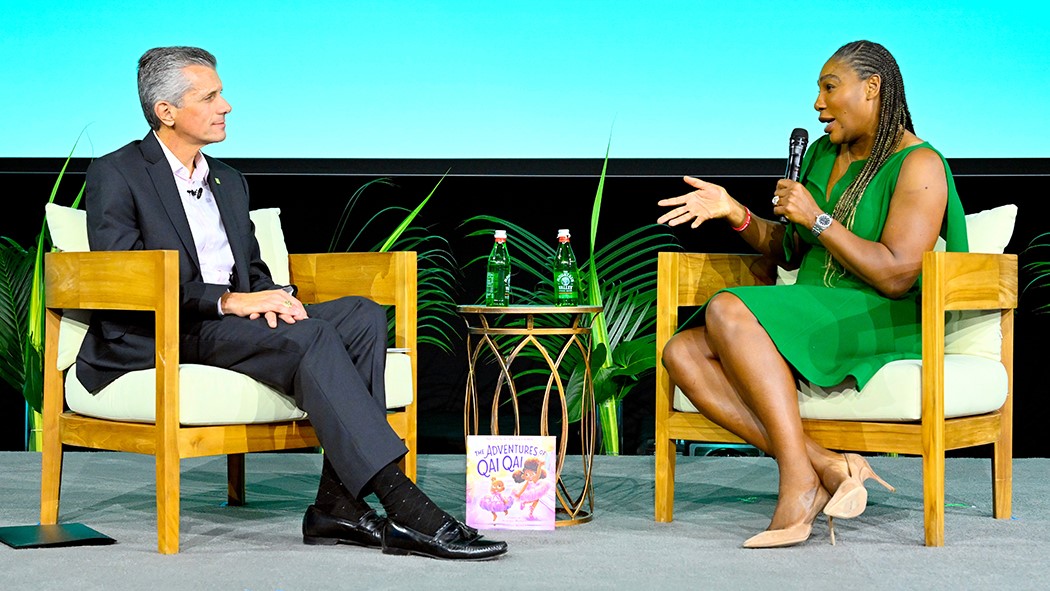
BLOOMFIELD, Conn., Oct. 26, 2022 – Cigna Corporation, a global health service company, unveiled new insights from the Evernorth Vitality IndexTM, the largest study on the state of vitality, health and productivity in America. Findings show that vitality can be a key driver of personal, business and community growth, yet less than 20 percent of Americans are living with high vitality and Generation Z adults (aged 18-24) have the lowest levels of any age group. The full report is available here.
Cigna developed the Evernorth Vitality Index to fill an emerging need as people and businesses recover from the pandemic and seek to improve health and well-being and drive workforce engagement, retention and productivity.
“Harnessing the power of an individual’s vitality is critical to our nation’s future. The past few years clearly illustrated that health is multi-dimensional and we need a more comprehensive measurement approach – one that can assess how we are showing up at work, at home and in our communities,” said David M. Cordani, Cigna Chairman and Chief Executive Officer. “The Evernorth Vitality Index is a modern tool that can help us understand and influence vitality to help everyone thrive.”
Results from the study were previewed at an event in Nashville, Tenn., that featured a fireside chat between Serena Williams and Cordani.
“My personal journey as an athlete, mother and entrepreneur is impacted every day by how I’m feeling about my health, strength, and energy, so paying attention to my vitality is incredibly important to me,” Serena Williams said.
Evernorth Vitality Index key findings
The Evernorth Vitality Index was developed in partnership with Dr. Richard Ryan, co-founder of the Subjective Vitality scale, and the benchmark survey was given to more than 10,000 American adults (aged 18-75) in May 2022. The results confirmed that those with higher vitality experience a wide range of benefits, from better mental and physical health to higher levels of job satisfaction and performance.
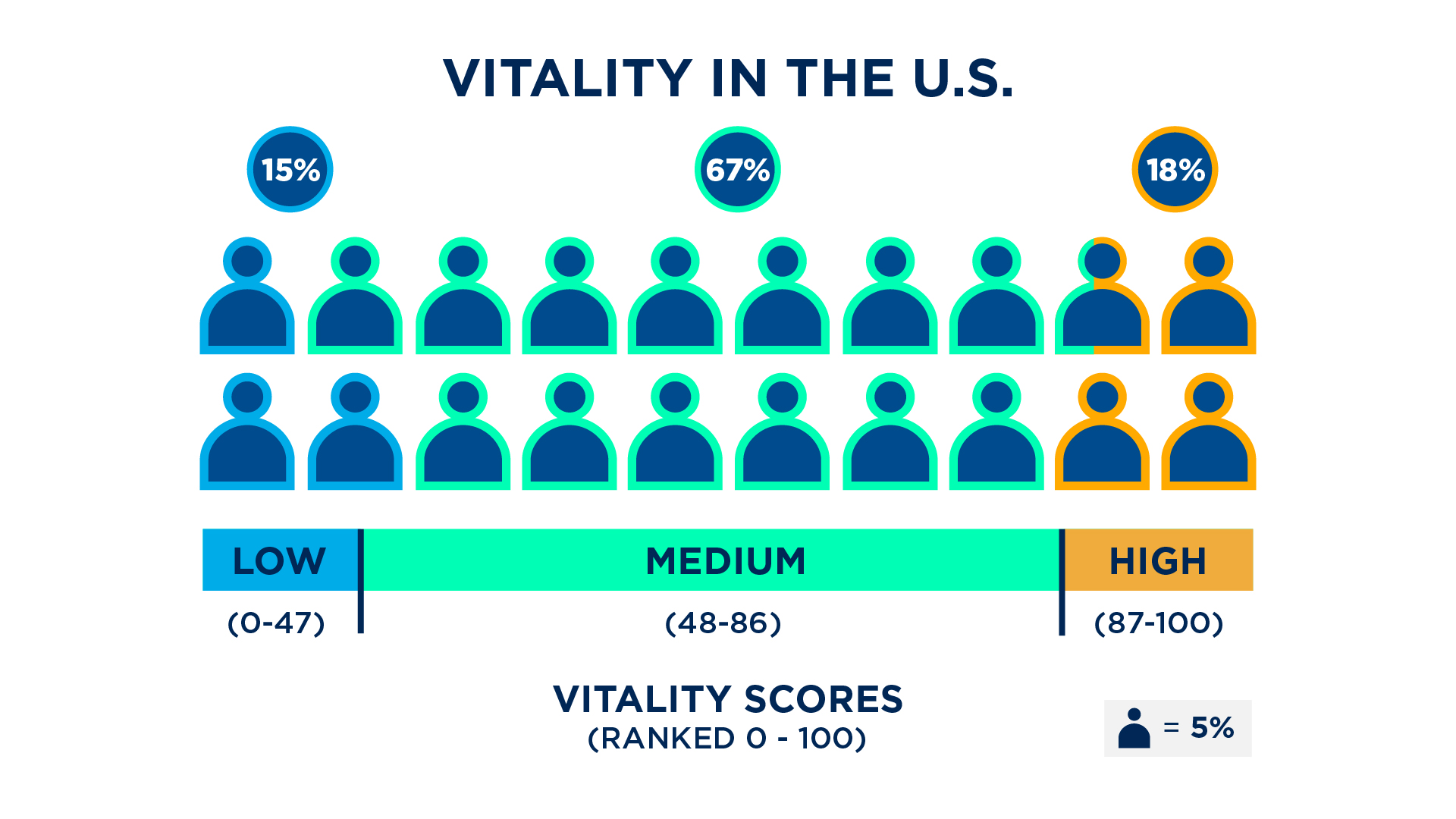 The Evernorth Vitality Index research revealed that fewer than one in five U.S. adults report high levels of vitality. Among the general population, the average vitality score is 67.4 out of 100.
The Evernorth Vitality Index research revealed that fewer than one in five U.S. adults report high levels of vitality. Among the general population, the average vitality score is 67.4 out of 100.
Generation Z adults (aged 18-24) are struggling more than any other age group surveyed. One in four reported low vitality levels, which is in stark contrast to the 10% of people aged 65-75 and the 16% of people aged 25-64 who fall into the low vitality category.
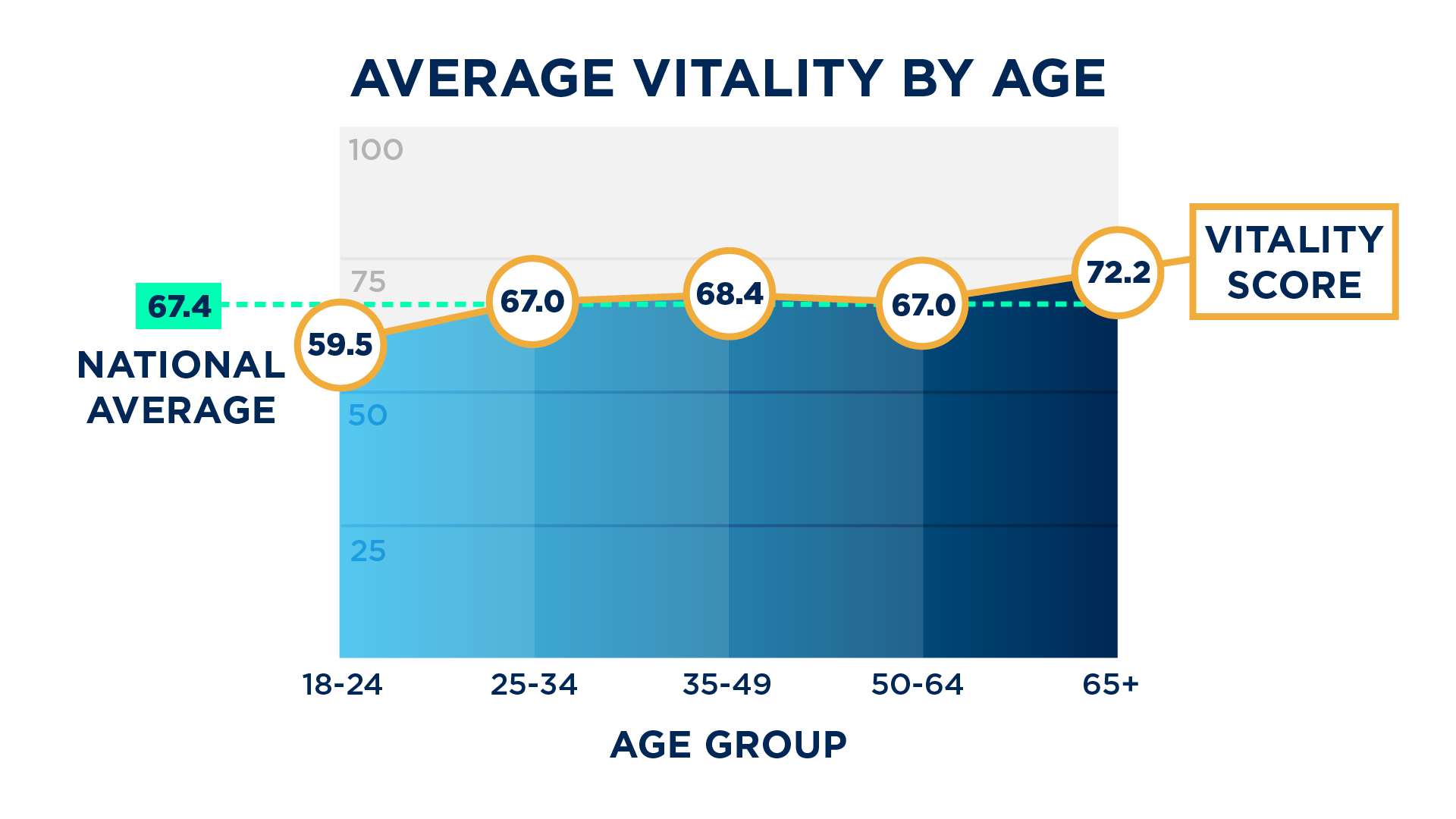 Generation Z adults are struggling the most. One in four Gen Z adults report low vitality levels, which is in stark contrast to the proportion of older adults who fall into the low vitality category.
Generation Z adults are struggling the most. One in four Gen Z adults report low vitality levels, which is in stark contrast to the proportion of older adults who fall into the low vitality category.
Higher vitality is linked to a more motivated, productive workforce, while low vitality contributes to poor work quality, higher turnover and workplace dissatisfaction. By better understanding vitality and the factors that impact it, employers can help fuel a healthier workforce and drive business and economic growth.
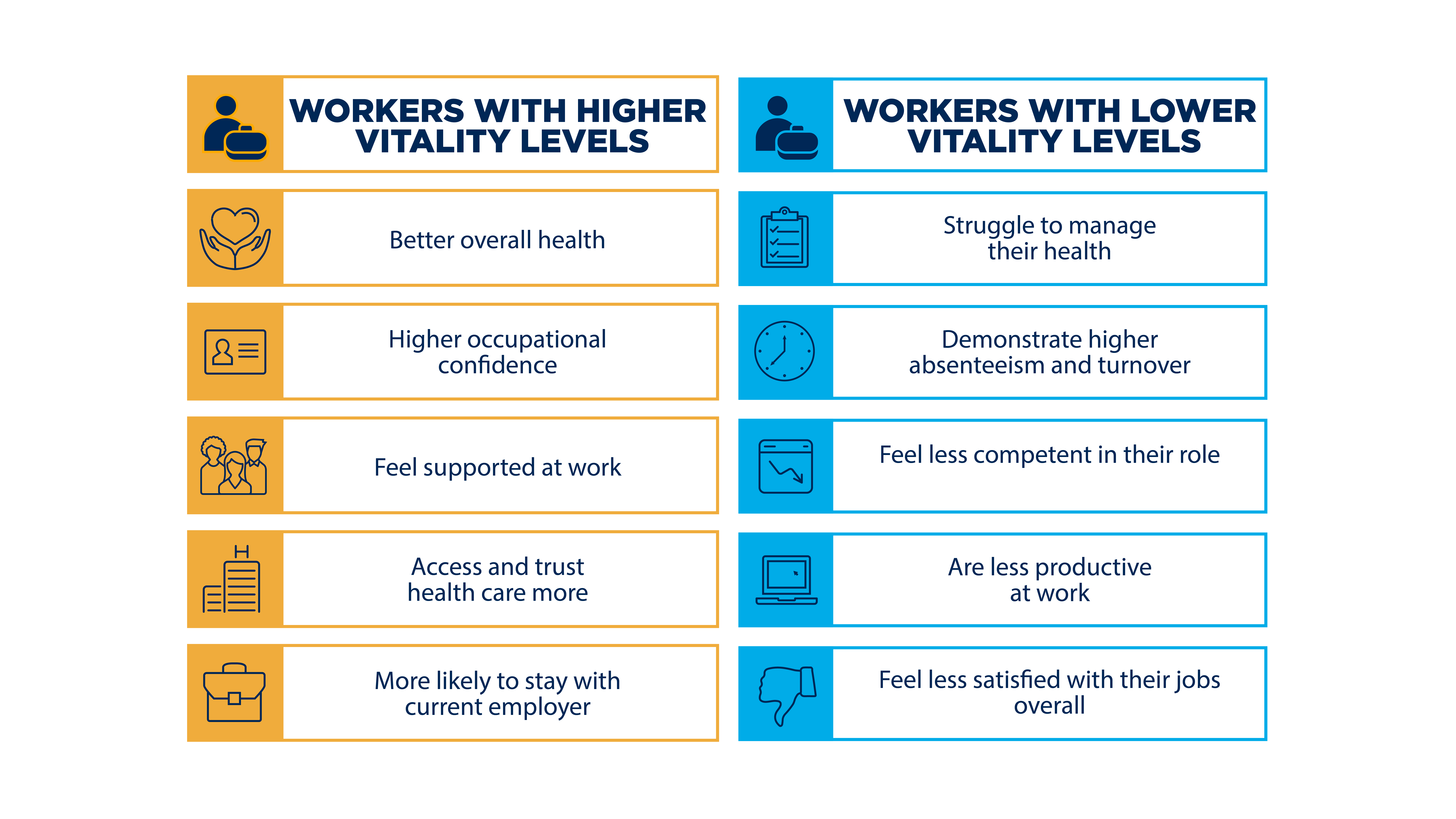 Higher vitality is linked to a more motivated, productive workforce, while low vitality contributes to poor work quality, higher turnover and workplace dissatisfaction.
Higher vitality is linked to a more motivated, productive workforce, while low vitality contributes to poor work quality, higher turnover and workplace dissatisfaction.
“Good mental and physical health is central to people’s vitality. Our research shows that when people have better health, they feel better about life. Likewise, when people feel higher levels of vitality, their health can improve,” said Dr. David Brailer, Chief Health Officer, Cigna. “Vitality is about all the dimensions of our lives that need attention. Going forward, Cigna will explore how health can drive vitality, whether that’s through products like Cigna Pathwell that create personalized end-to-end health journeys for patients with chronic conditions or by addressing the social determinants of health impacting our customers.”
The benchmark survey shows that vitality scores vary by life stage, gender, sexual orientation, community density, income and more. Read the full report here.
Cigna announces partnership with YMCA of the USA to support community vitality
The Cigna Foundation will prioritize investing in organizations and entities that support the vitality of local communities. To begin, the Foundation will partner with YMCA of the USA (Y-USA) and contribute $1 million to support three years of vitality programming at YMCAs in Houston, Memphis, Nashville, Phoenix and St. Louis.
“Community organizations demonstrate the importance of vitality every day – they can both strengthen and be strengthened by the vitality of the people they serve,” said Susan Stith, President of the Cigna Foundation. “The Y is a perfect example as they have long been at the forefront of responding to community needs through a multi-dimensional lens, and we are honored to partner with them on this important program.”
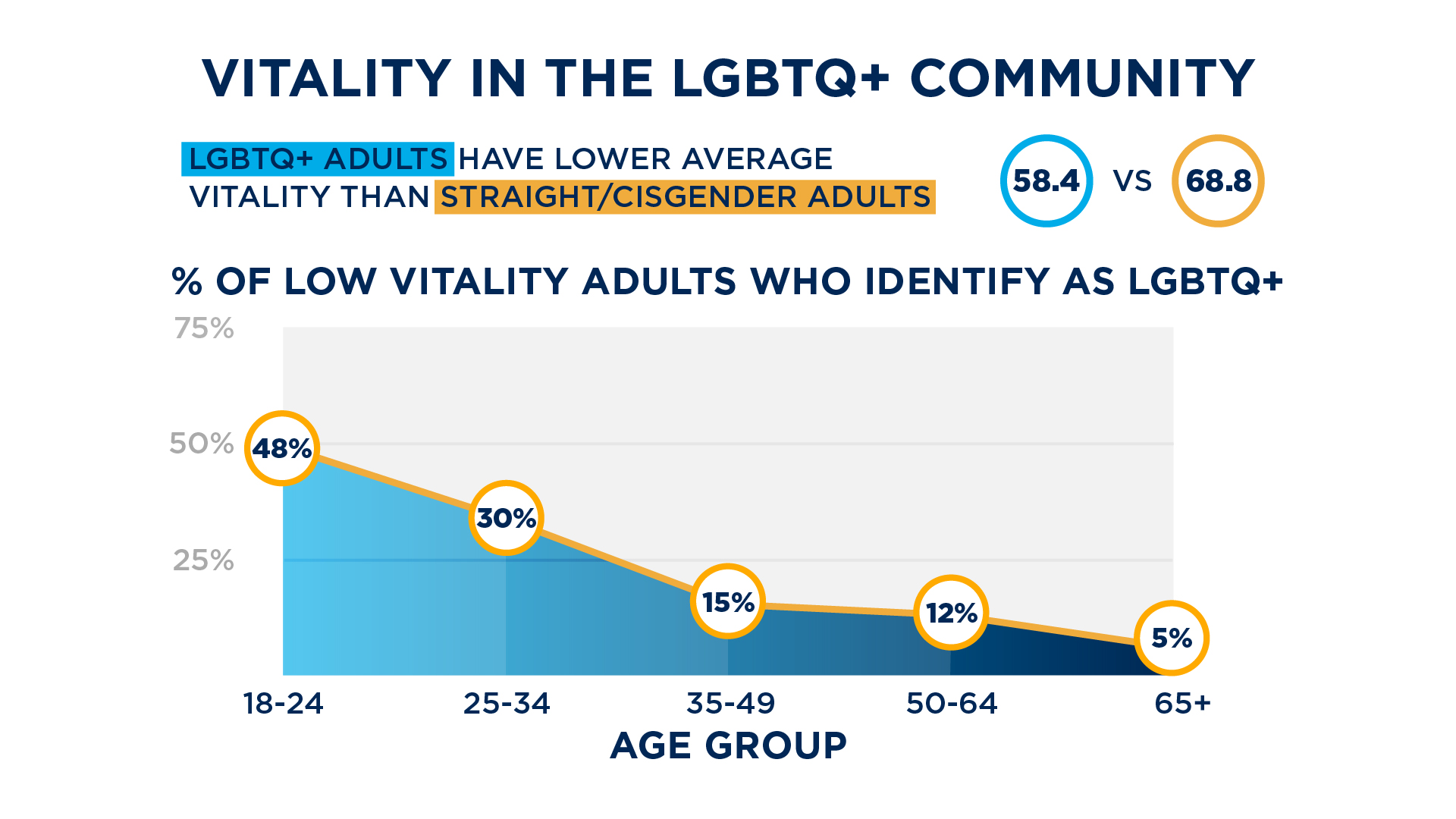
Nearly half of Gen Z adults with low vitality identify as LGBTQ+, and LGBTQ+ adults have substantially lower vitality levels than heterosexual, cisgender adults.
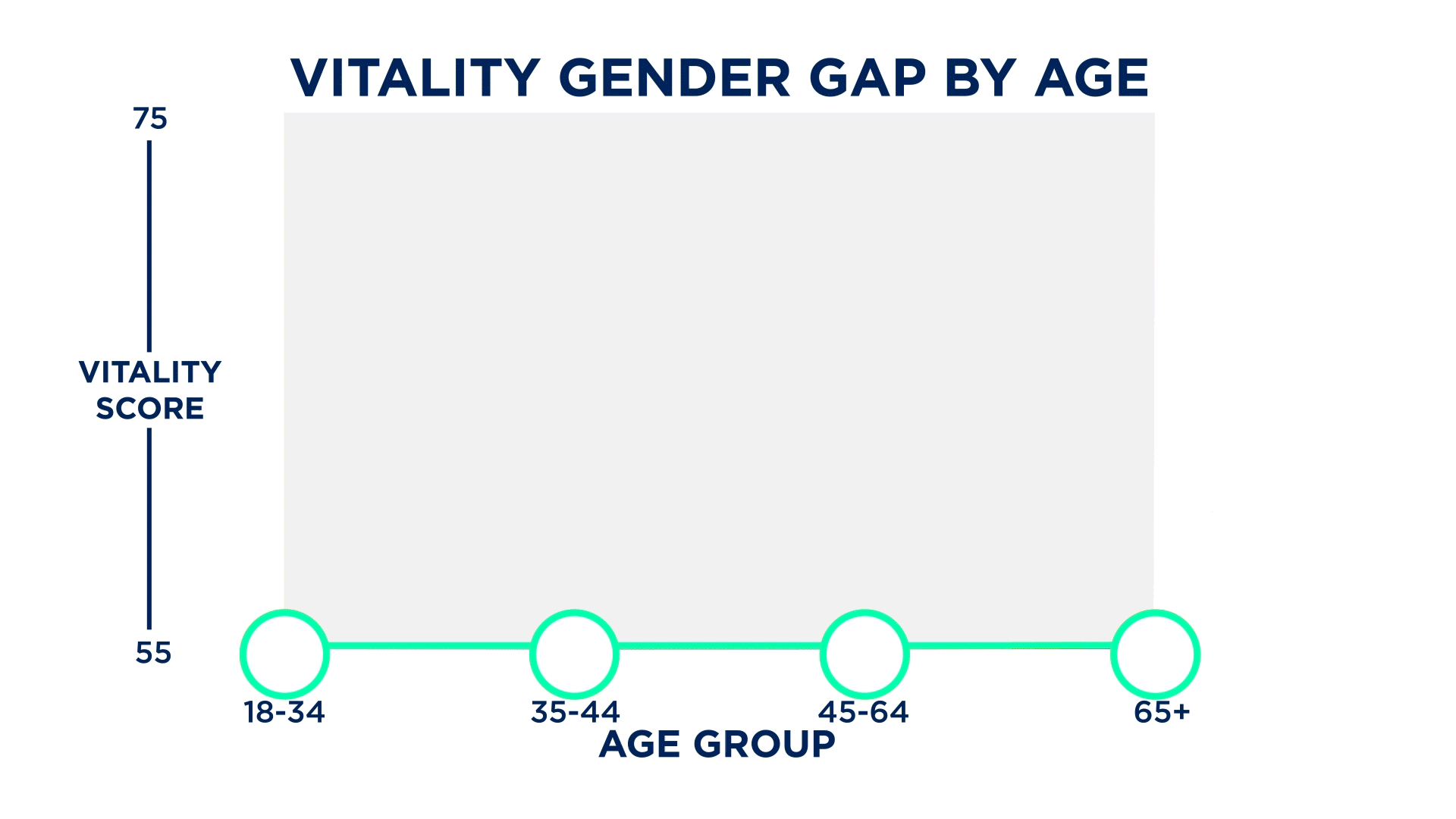
The study reveals that women struggle disproportionately with their vitality and overall well-being. Women are 50% more likely to have low vitality levels than men (18% vs. 12%).
About Cigna
Cigna Corporation is a global health service company dedicated to improving the health, well-being and peace of mind of those we serve. Cigna delivers choice, predictability, affordability and access to quality care through integrated capabilities and connected, personalized solutions that advance whole-person health. All products and services are provided exclusively by or through operating subsidiaries of Cigna Corporation, including Cigna Health and Life Insurance Company, Connecticut General Life Insurance Company, Evernorth companies or their affiliates, and Express Scripts companies or their affiliates. Such products and services include an integrated suite of health services, such as medical, dental, behavioral health, pharmacy, vision, supplemental benefits, and other related products. Cigna maintains sales capability in over 30 countries and jurisdictions and has more than 190 million customer relationships throughout the world. To learn more about Cigna®, including links to follow us on Facebook or Twitter, visit www.cigna.com.
Media Contact:
Justine Sessions
860-810-6523
justine.sessions@cigna.com